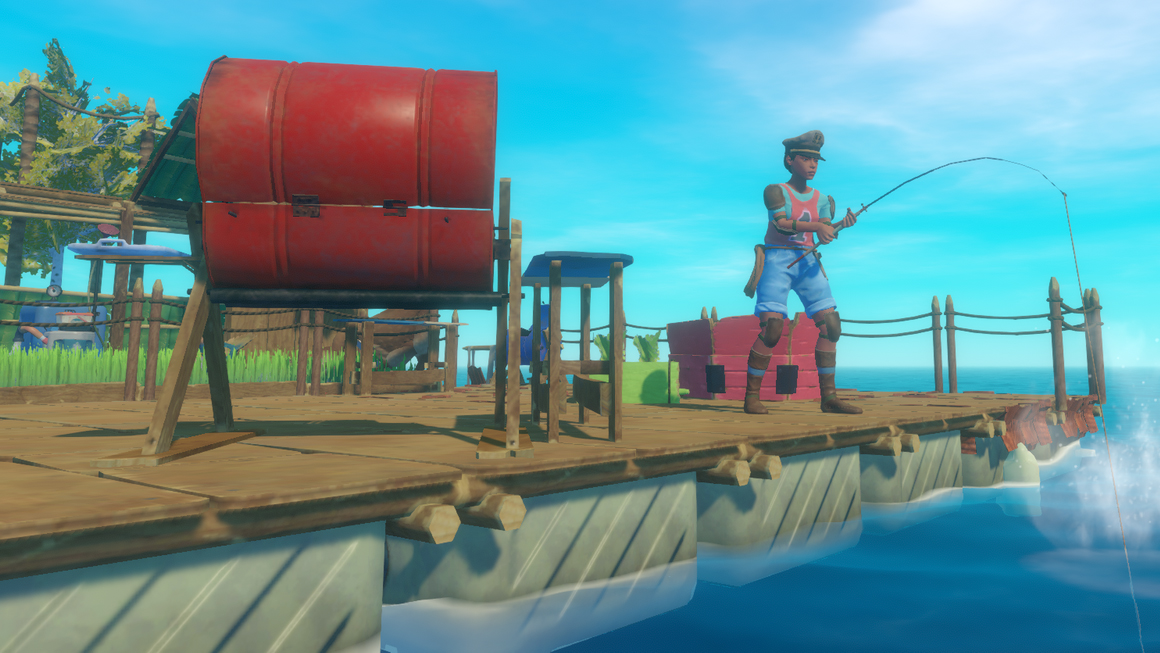Our Verdict
A choppy start leads to a compelling survival experience in Raft.
PC Gamer's got your back
What is it? An open world survival game where you build a floating base on an endless ocean.
Expect to pay: $20/£17.49
Developer: Redbeet Interactive
Publisher: Axolot Games
Reviewed on: RTX 2080, Intel i7-9700K, 16GB RAM
Multiplayer? Yes
Link: Official site
Our oceans are clogged with plastic trash, but here's a small silver lining: All that garbage is keeping me alive. In open world survival game Raft, which spent four years in early access before hitting 1.0 in June, I turned a collection of floating trash into a floating base—a big, cluttered, ugly floating base, but it's packed with life-saving amenities and I've slowly come to love it like a home.
Just like my raft itself, Raft the game took quite a while to fall in love with. The first few hours were so rough I probably would have just quit if I weren't writing a review. With just four squares of wood to stand on, I slogged through the opening hours, constantly near death from malnutrition and dehydration, feverishly casting a brittle plastic hook into the waves to fish out every last bit of trash I could, piece by piece. I fought off a hungry shark with a crude spear made from planks, I scurried onto tiny passing islands to gather handfuls of fruit to eat, and drifted slowly and miserably across the sea on a little raft I couldn't stop or steer or control. Most of the crafting I did was just to replace my basic tools, like my trash hook and spear, when they broke after just a few uses. Those early hours were frantic, stressful, and not much fun at all.
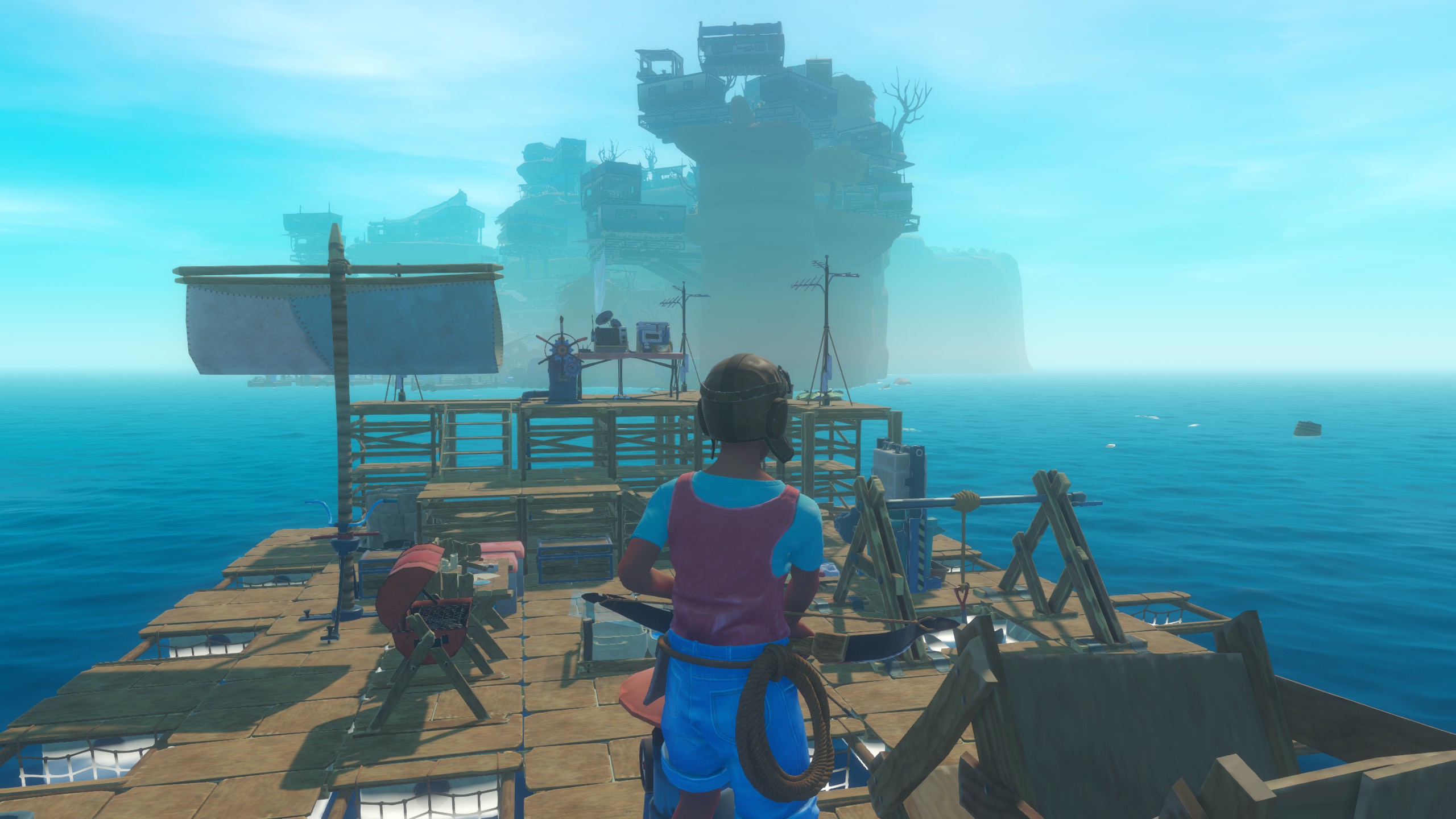
But after a few hours of surviving (and frequently swearing) I used my collected garbage to make my raft a little bigger, unlocked new blueprints that allowed me to craft more useful items like a seawater purifier, a fishing rod, and grill for cooking, and without having to worry about death quite so constantly I eventually discovered an engrossing survival experience. I went from wanting to quit Raft to finding it extremely hard to stop playing, and helping me sail through the choppy opening hours into more enjoyable waters was the realization that the river of trash on the endless ocean wasn't just letting me build stuff. It was leading somewhere.
Hope Floats
Raft isn't just a matter of crafting and survival, it's a curious mystery to solve with a story that slowly reveals itself. Drifting from island to island, chopping down spare trees for wood and digging up ore from the seabed eventually allowed me to craft technology like a radio receiver, a battery, and some antennas. A signal then led me to a mysterious, rusting radio tower poking out of the sea, and the clues I gathered there gave me a pip on my radar screen. This led me to another location to explore, loot, and obtain coordinates to the next story location. The journey that began as aimless drifting now had some destinations to focus on, which gave all that crafting more of a purpose than simply catching enough fish to avoid starvation.
Once I'd crafted a ragged sail and a plastic shovel to use as a paddle, I could finally… well, not really steer my ship but at least aim it at passing islands. Building an anchor was even better because I could properly stop to catch my breath on the little islands I came across, which made gathering resources feel more like leisurely fun than a frantic chore. And unlike other survival games where reaching distant areas of the map might require you to build multiple bases, in Raft your base comes with you, so you never need to start over from scratch.
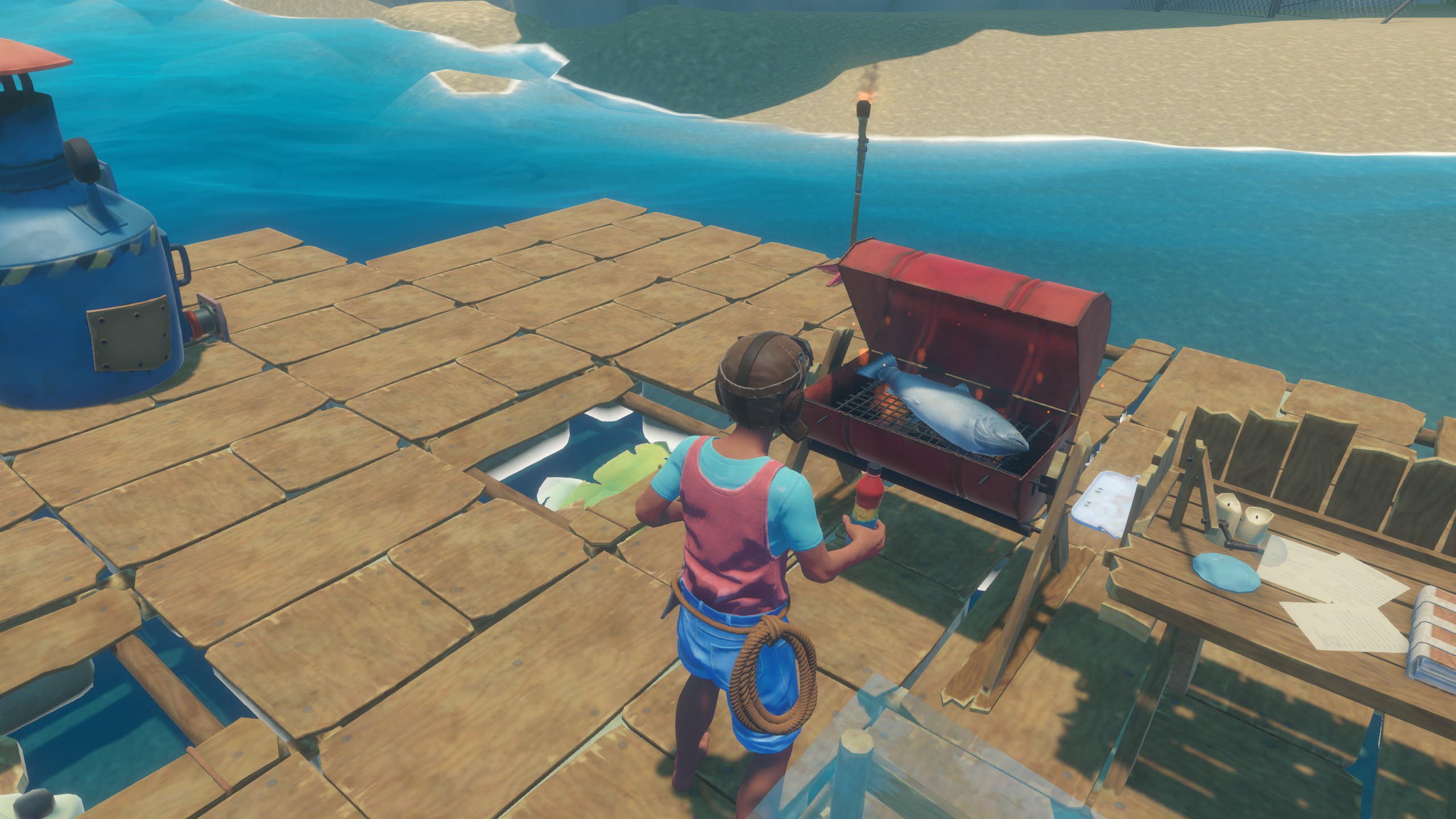
Following the story also led to some genuinely exciting moments. After spending days on end visiting only tiny, wimpy little islands, seeing something truly massive looming on the horizon was a thrill. I came across a huge abandoned yacht, a massive outpost built from cargo containers, and a mountainous national park rising above the waves.
These locations came with puzzles, small quests, new creatures to tame or fight, and loads of useful loot. Audio diaries explained what had happened there (usually something terrible) and told me where everyone had gone, giving me interesting details about the wet apocalypse. Also, honestly, it was just nice to hear some voices in a world that at times feels extremely lonesome (unless you're playing with a friend in co-op). Most importantly, these story areas gave Raft a welcome change of pace by letting me wander away from my floating base to explore, sometimes for days at a time.
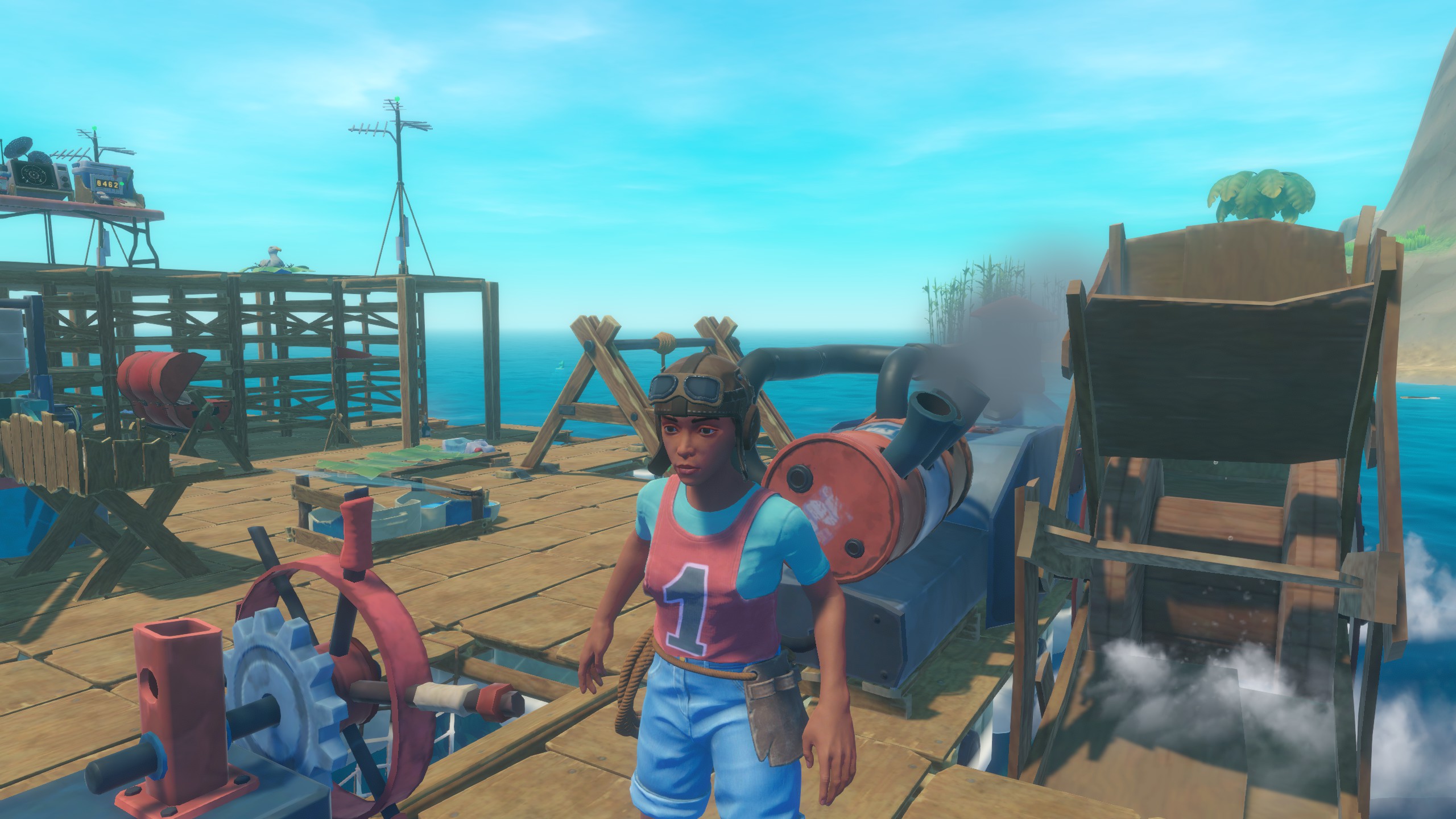
Full steam ahead
Raft suddenly felt like a completely different game, a much better one in which I was an intrepid explorer instead of just a mostly helpless passenger.
The real turning point was when I was able to bolt a wood-burning engine and a steering wheel onto my raft. Finally, after helplessly floating wherever the wind took me, I could actually pilot my big messy base in any direction I wanted. Raft suddenly felt like a completely different game, a much better one in which I was an intrepid explorer instead of just a mostly helpless passenger. Even better, I was able to line the edges of my raft with nets that automatically collected any trash I floated over, so I bid a not-so-fond farewell to the long hours spent fishing trash out of the sea with my hook. A proper fishing rod, a bow and arrow to kill birds foolish enough to land on my raft, and an upgraded desalinator meant food and hydration were rarely a concern.
This doesn't mean it was smooth sailing from then on. There were still plenty of threats, like an ever-present shark, plus giant rats and fearsome bears on certain islands, and occasional mad scrambles to find resources to replace broken high-level gear, but being able to automate some survival chores left more time to just have fun exploring the world.
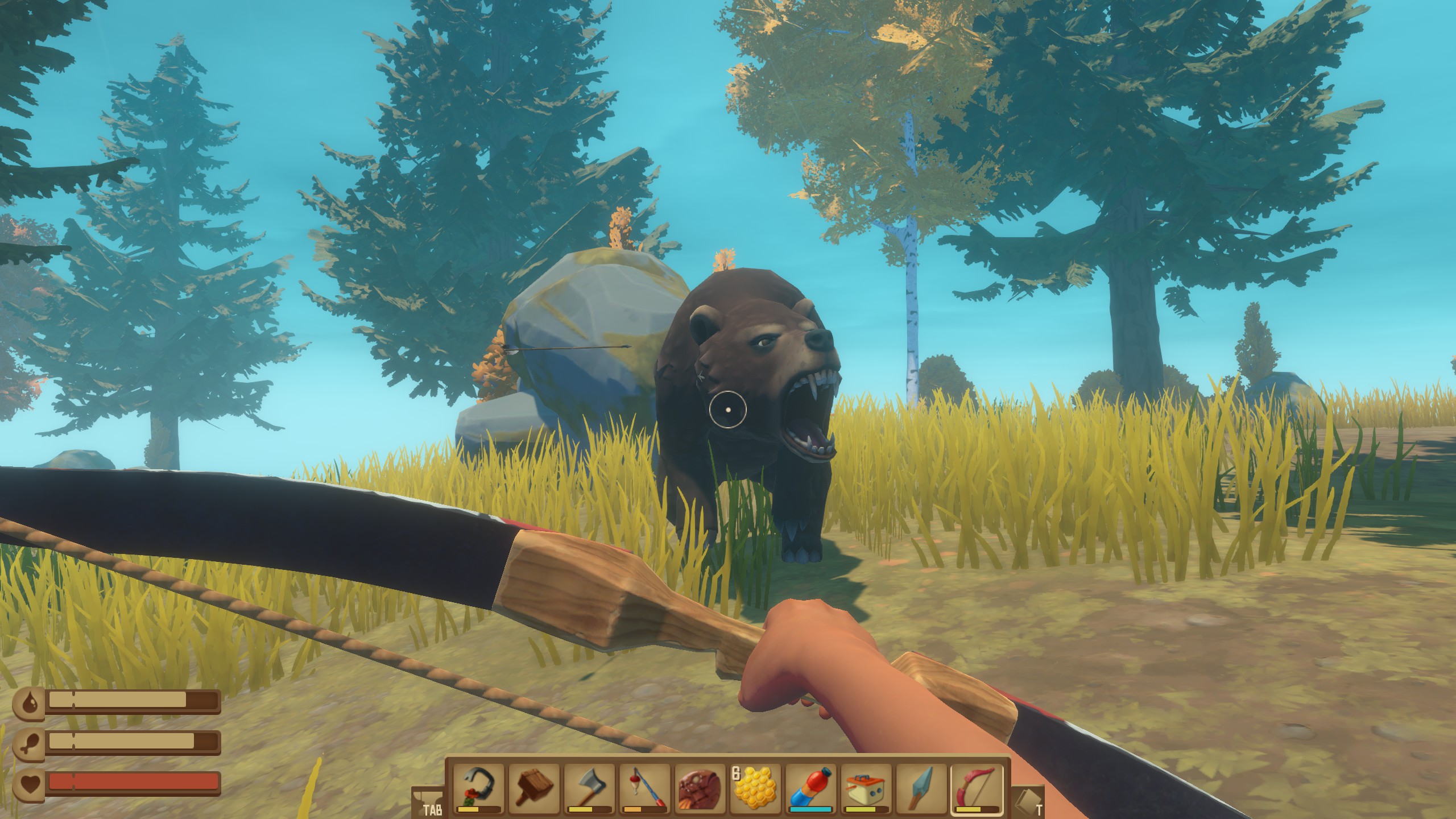
While I hated the opening hours of Raft, it really grew on me and I love how the crafting progression felt empowering, with major new items like the engine and steering wheel giving the game an entirely different feel. My raft is still a mess—constructing it was like placing a bunch of furniture first and then trying to build a house around it—but I still wound up loving my mobile base and I had plenty of free time to alter it so it functioned a bit better. Gone are the days of fleeing my raft to find sustenance: It's now so well stocked that the danger comes from leaving it behind without bringing enough supplies with me.
In fact, I had so much spare garbage I even found myself occasionally chucking stuff I didn't need over the side. I'm trying not to think of it as polluting. More like giving back to an ocean that generously gave me so much.
A choppy start leads to a compelling survival experience in Raft.

Chris started playing PC games in the 1980s, started writing about them in the early 2000s, and (finally) started getting paid to write about them in the late 2000s. Following a few years as a regular freelancer, PC Gamer hired him in 2014, probably so he'd stop emailing them asking for more work. Chris has a love-hate relationship with survival games and an unhealthy fascination with the inner lives of NPCs. He's also a fan of offbeat simulation games, mods, and ignoring storylines in RPGs so he can make up his own.
